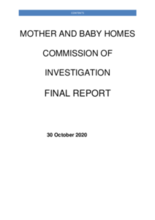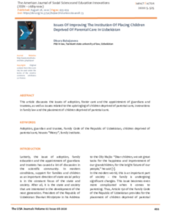Displaying 101 - 110 of 660
This paper explores how pediatricians can support families who care for children and adolescents who are fostered and adopted while attending to children’s medical needs and helping each child attain their developmental potential.
The Commission of Investigation into Mother and Baby Homes and certain related matters was established by the Irish Government in February 2015 to provide a full account of what happened to vulnerable women and children in Mother and Baby Homes during the period 1922 to 1998.
This study explored the feelings, perceptions, and stigma experienced by families of internationally adopted children with special needs.
No reconocimiento de Kafala constituida entre ciudadanos marroquíes a efectos de adopción. Antecedentes y alcance de la prohibición contenida en el artículo 19.4 de la Ley de adopción internacional.
This article charts the UK history of contact in fostering and adoption as it relates to looked after children and their birth relatives. It builds on a recent publication in this journal by one of the authors based on her research on the use of social media by children in care.
This study investigated rates of guardianship and adoption dissolution using a complete entry cohort from a large state foster care system and the associations between child characteristics and risk factors with dissolution.
This paper is an analysis on the history of adoption in India and the machinery in place now.
The aim of this article is to contribute to ongoing discussions about the recently passed Canadian legislation, drawing on lessons learned in the United States context.
This chapter compares and contrasts trends in international adoption in China and India over a period of 27 years from 1992 to 2018.
This article discusses the issues of adoption, foster care and the appointment of guardians and trustees, as well as issues related to the upbringing of children deprived of parental care, innovations in family law and the placement of children deprived of parental care in Uzbekistan.


